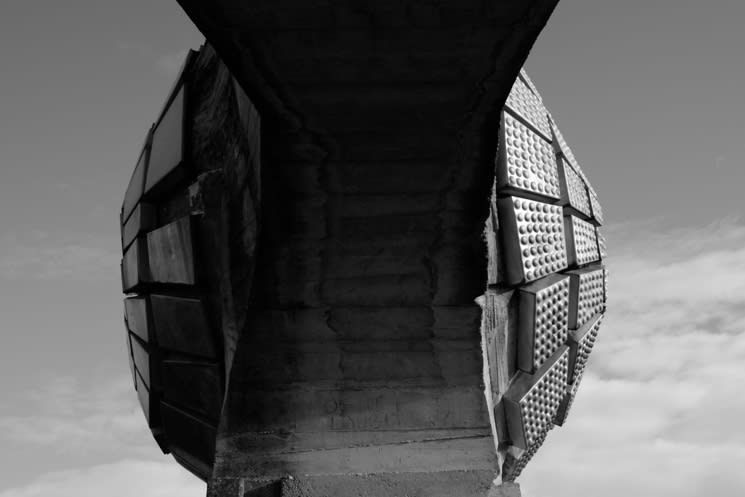"But listen patiently — this is not the last word."
Tilda Swinton speaks these words as the narrator in Last and First Men as an agent of the future speaking to humanity of the present. The sole directorial effort of Jóhann Jóhannsson — who scored The Theory of Everything and key works for Denis Villeneuve, along with being a modern composer and musician in his own right — demands its audience consider big questions about humanity's future. Through shots of isolated structures and black-and-white landscapes met by a score fitting Jóhannsson's body of work, the film begins to consider the limits of existence.
Swinton's narration is adapted from a 1930s sci-fi novel, a description of how a version of humanity lives "2,000 millions years" in the future. As an agent of this culture, she speaks of a society flung into the stars, whose lifespans are difficult to grasp and whose milestones correlate with our own in only the most basic terms.
Last and First Men illustrates this with shots of sculptures, buildings and natural relief, illustrating something of the future in imagery from our present and past. The 16mm stock has grain to it, and the only flashes of colour are when Swinton's narration is represented visually as a kind of waveform. Jóhannsson and his collaborators move the camera in ways that discover new features, that mirror shapes, and that reflect the mood of the environment and Swinton's narration.
The score's engagement with these visuals is key. Together with Yair Elazar Glotman, Jóhannsson's music here captures the features of his best known works, in its eerie resonances, moments of spare reserve and occasional swelling beauty. The variety and depth of the composition recalls his strongest work to date.
Jóhannsson died in 2018 at age 48. It's difficult not to watch Last and First Men with the frame of Jóhannsson's end, at least because it seems to capture so much of his work. The music is as accomplished as anything he's done to date, and to see it in dialogue with visuals he's directing is fascinating. It's difficult to watch the film without imagining what might have been, but a great success of Last and First Men is in capturing him as the artist he was.
Festival du nouveau cinéma is taking place online from October 7 to 31.
(Zik Zak Filmworks)Tilda Swinton speaks these words as the narrator in Last and First Men as an agent of the future speaking to humanity of the present. The sole directorial effort of Jóhann Jóhannsson — who scored The Theory of Everything and key works for Denis Villeneuve, along with being a modern composer and musician in his own right — demands its audience consider big questions about humanity's future. Through shots of isolated structures and black-and-white landscapes met by a score fitting Jóhannsson's body of work, the film begins to consider the limits of existence.
Swinton's narration is adapted from a 1930s sci-fi novel, a description of how a version of humanity lives "2,000 millions years" in the future. As an agent of this culture, she speaks of a society flung into the stars, whose lifespans are difficult to grasp and whose milestones correlate with our own in only the most basic terms.
Last and First Men illustrates this with shots of sculptures, buildings and natural relief, illustrating something of the future in imagery from our present and past. The 16mm stock has grain to it, and the only flashes of colour are when Swinton's narration is represented visually as a kind of waveform. Jóhannsson and his collaborators move the camera in ways that discover new features, that mirror shapes, and that reflect the mood of the environment and Swinton's narration.
The score's engagement with these visuals is key. Together with Yair Elazar Glotman, Jóhannsson's music here captures the features of his best known works, in its eerie resonances, moments of spare reserve and occasional swelling beauty. The variety and depth of the composition recalls his strongest work to date.
Jóhannsson died in 2018 at age 48. It's difficult not to watch Last and First Men with the frame of Jóhannsson's end, at least because it seems to capture so much of his work. The music is as accomplished as anything he's done to date, and to see it in dialogue with visuals he's directing is fascinating. It's difficult to watch the film without imagining what might have been, but a great success of Last and First Men is in capturing him as the artist he was.
Festival du nouveau cinéma is taking place online from October 7 to 31.
